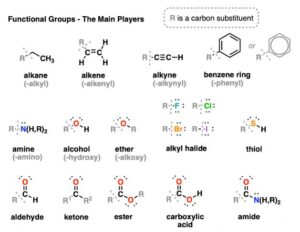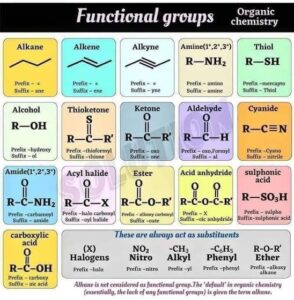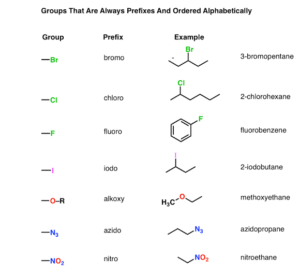Back to: Organic Chemistry 100 Level
Welcome to class!
Hey there, champion! I’m really glad you’re here again today. You’re growing stronger and smarter with each lesson, and I’m proud to be your guide on this exciting chemistry journey. Today’s topic is like learning the “personality traits” of organic compounds — we’re talking about Functional Groups, especially Alcohols, Ethers, and Halides. These are very important in both chemistry and everyday life in Nigeria. Let’s walk through them together, one step at a time!
Functional Groups I: Alcohols, Ethers, Halides
What Are Functional Groups?
Imagine you have three friends who all wear white school uniforms, but one always wears a red cap, another wears black shoes, and the third carries a green backpack. Even though their uniforms look the same, you can tell them apart because of these extra features. That’s exactly what functional groups do in Organic Chemistry — they give compounds their unique “behaviour” and make them stand out.

A functional group is a specific group of atoms within a molecule that is responsible for how that molecule behaves in a chemical reaction. It’s like the active part of the compound that decides what the compound can do.
Let’s now look at three common and useful functional groups: Alcohols, Ethers, and Halides.
1. Alcohols (–OH group)
An alcohol is an organic compound that contains one or more hydroxyl (–OH) groups attached to a carbon atom.
Think of alcohols as water molecules where one hydrogen is replaced with a carbon-containing group.
Examples of alcohols include:
Methanol (CH₃OH) – used as a solvent and fuel
Ethanol (C₂H₅OH) – found in alcoholic drinks and sanitisers
Propanol (C₃H₇OH) – used in cosmetics and cleaning products
Naming alcohols:
Use the name of the corresponding alkane, then replace the –e at the end with –ol. For example:
Methane becomes methanol
Propane becomes propanol
Real-life uses:
In Nigeria, ethanol is used in hand sanitisers, perfumes, and even in herbal mixtures. Alcohols are also used in fuel and in making medicines.
2. Ethers (R–O–R’)
Ethers have an oxygen atom connected between two carbon groups. You can picture it like a bridge holding two people’s hands — that oxygen is the bridge.

Structure: R–O–R’, where R and R’ are carbon chains.
Example:
Diethyl ether (CH₃CH₂–O–CH₂CH₃) – once used as an anaesthetic in hospitals
Naming ethers:
You name the two carbon groups, then add “ether” at the end. For example: if both sides have ethyl groups, it’s called diethyl ether.
Real-life uses:
Ethers are used as solvents, especially in laboratories, and sometimes in making perfumes and oils.
3. Halides (Haloalkanes)
Halides are organic compounds where one or more hydrogen atoms are replaced by halogen atoms — like chlorine, bromine, fluorine, or iodine.
These are also called haloalkanes or alkyl halides.
Examples include:
Chloromethane (CH₃Cl)
Bromomethane (CH₃Br)
Iodoethane (C₂H₅I)
Naming halides:
Name the halogen (chloro, bromo, iodo, fluoro) and add it to the alkane name. For example:
CH₃Cl is called chloromethane
C₂H₅Br is called bromoethane

Real-life uses:
Haloalkanes are used in making refrigerants (for freezers and air conditioners), pesticides, anaesthetics, and even fire extinguishers. They’re also used in manufacturing plastics.
Summary
- Functional groups are parts of molecules that give them their unique properties.
- Alcohols contain –OH and are used in sanitisers, fuels, and medicines.
- Ethers have an oxygen between two carbon chains and are used as solvents.
- Halides contain halogen atoms and are used in refrigerants, pesticides, and plastics.
- Understanding functional groups helps us predict how organic compounds behave in real life.
Evaluation
- What is a functional group, and why is it important?
- Name the functional group found in alcohols.
- Write the name of the compound CH₃CH₂OH.
- What is the structure of an ether?
- Mention two uses of halides in daily life.
You did fantastic today! These small groups of atoms may seem tiny, but they control how compounds act—and now, you understand them like a pro! Keep believing in yourself, keep showing up, and keep learning. With Afrilearn, you’re not just studying for exams—you’re preparing for greatness. See you in the next class, champion!
